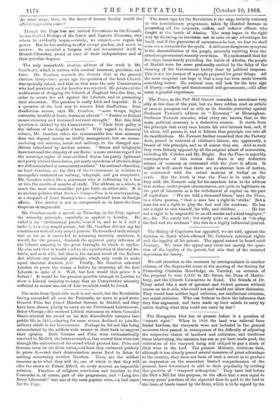The only remarkable election address of the week is Mr.
Goschen's, which is written with unusual terseness, precision, and force. Mr. Goschen reminds the electors that at the general election thirty-three years ago the question of the Irish Church was specially raised, and that on that issue the only Conservative who had previously sat for London was rejected. He points out the recklessness of dragging the Church of England into the fray, in order to secure her aid against the Liberals, and so promoting their alienation. The question is really Irish and imperial. It is a question of the best way to remove Irish disaffection. Irish disaffection means, says Mr. Goschen, "more troops, higher estimates, trouble at home, weakness abroad." "Justice to Ireland means economy and increased national strength." But this Irish question is shirked by the Conservatives. "Their Irish policy is the defence of the English Church." With regard to financial reform, Mr. Goschen takes the statesmanlike line that economy does not depend merely on thrifty management, but on accom- modating our services, naval and military, to the changed con- ditions introduced by modern science. "Steam and telegraphs have increased the ubiquity of our fleets ; a more anxious regard for the sovereign rights of semi-civilized States has partly lightened and partly altered these duties, yet costly squadrons of obsolete ships are still maintained at unnecessary stations." On national education, on local taxation, on the duty of the Government in relation to monopolies conferred on railway, telegraph, and gas companies, Mr. Goschen writes like a statesman who is indicating by a line or two the results of months of study. The address, as a whole, is much the most statesmanlike yet put forth on either aide. It is to modern politics what Burton's Compendium is to conveyancing, or a despatch of Lord Stanley's to a complicated issue in foreign affairs. The matter is not so compressed as to leave the form shapeless or ungraceful.


































 Previous page
Previous page